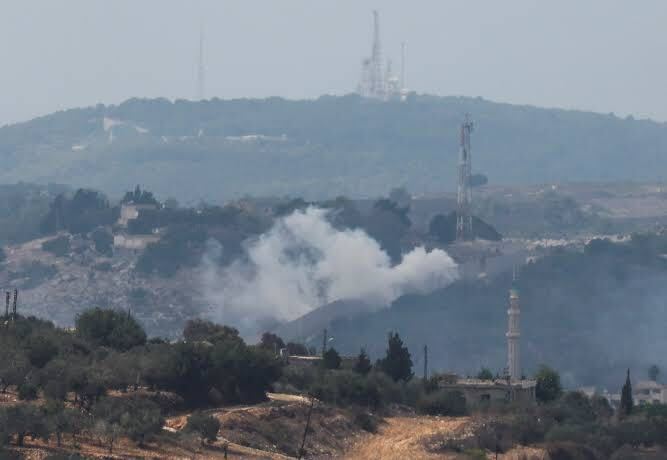Hezbollah remains Israel’s most significant threat along its borders.
The head of the United Nations peacekeeping force in Lebanon voiced “deep concern” over a spike in cross-border attacks between Hezbollah and Israel as the two sides continued to escalate fighting as the war in Gaza rages on.
Lebanon’s southern border has become the stage for an escalating exchange of fire, primarily between Israel and Hezbollah, a key ally of Hamas, sparking fears of a wider and more dangerous conflict.
Following a meeting with Lebanese Prime Minister Najib Mikati and Hezbollah ally Parliament Speaker Nabih Berri, the Commander of the United Nations Interim Force in Lebanon (UNIFIL) Lieutenant General Lazaro pointed out the critical need to prevent further escalation, protect civilian lives, and ensure the safety of peacekeepers operating in the area.
“UNIFIL’s priorities right now are to prevent escalation, safeguard civilian lives, and ensure the safety and security of peacekeepers who are trying to accomplish this,” he said in a statement.
On Monday, Israeli airstrikes in south Lebanon killed two people, as reported by a first-responder organisation affiliated with the Hezbollah-allied Amal Movement.
On the Israeli side, a Hezbollah missile attack on Sunday resulted in injuries to several workers from the Israel Electric Company, with one succumbing to his wounds on Monday, according to the company.
At least 88 lives have been lost in Lebanon since hostilities began, according to a revised AFP tally. This includes over 60 Hezbollah fighters, 13 combatants from various Palestinian groups, and 10 civilians. In northern Israel, the toll stands at nine deaths, including six soldiers, according to Israeli authorities.
The recent series of clashes represent the most severe violence at the border since the month-long war between Hezbollah and Israel in 2006.
In the wake of the intensifying conflict between Hezbollah and Israel since the war on Gaza in October, more than 19,646 people in Lebanon have been internally displaced, the United Nations migration agency, the International Organization for Migration (IOM) reported.
The situation escalated further last month when a UN peacekeeper near the border village of Hula was wounded by shelling, shortly after a shell struck UNIFIL’s headquarters in Naqura near the Israel-Lebanon border.
International concern is growing, with the United States, France, and other Western nations cautioning against Lebanon being dragged into a full-scale war.
Lazaro emphasised UNIFIL’s crucial role in conveying messages to reduce tensions and prevent misunderstandings.
Meanwhile, Hezbollah leader Sayyed Hassan Nasrallah on Saturday declared that the Lebanon front would “remain active” and noted a “quantitative improvement” in the pace of the group’s operations. Israeli regime’s Prime Minister Benjamin Netanyahu, on Monday cautioned Hezbollah against expanding its attacks.
In an interview with Al Jazeera on Sunday, Lebanon’s Mikati expressed confidence in the “rationalism” displayed by Hezbollah thus far. Emphasising the importance of self-restraint, Mikati said Israel should halt its ongoing provocations in south Lebanon to prevent further escalation.
Meanwhile, Lazaro pointed out the challenge facing UN Security Council Resolution 1701, which brought an end to the 2006 war between Hezbollah and Israel. Established in 1978 to oversee the withdrawal of Israeli forces after the 1978 invasion of Lebanon, UNIFIL saw reinforcement after the 2006 war.
With approximately 10,000 peacekeepers, the UN’s primary task is to monitor the ceasefire between Hezbollah and Israel.
The backdrop of the conflict is particularly troubling for Lebanon, which spent years rebuilding from the 2006 war and is currently grappling with a financial crisis
Hezbollah remains Israel’s most significant threat along its borders.
The 2006 war killed some 1,200 people in Lebanon, predominantly civilians, and 157 Israelis, mostly occupation soldiers.







